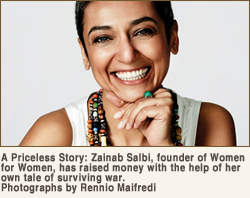Written by Nancy Lublin
Published: http://www.fastcompany.com/magazine/147/
Editor's Note: I love this article because it is about simple, common sense. For profit and non profit leaders alike can gain from such simple suggestions as "the vaguer you are, the less likely you are to get a yes". And "the first step to energizing your base is to show them that you care". [more]
 Zilch: Get What You Want for Nothing
Zilch: Get What You Want for Nothing
Written by Nancy Lublin
Recently, I was in a meeting at the offices of a ginormous global conglomerate. Eight of us sat around a big, beautiful table made of incredible wood no doubt harvested from some disappearing rain forest. They served the most amazing, still-warm oversize oatmeal cookies with white chocolate chips. We were discussing the launch of a new ad campaign, so the mood should have been corks-popping celebratory. But the day before, the corporation's budget for the project had been slashed. By "slashed," they meant down to a mere $2 million, and everyone in the room was either dejected or panicky. The top exec -- who was wearing handcrafted leather shoes so lovely that the left one could have been sold on eBay and fed a family of six in Rwanda for a year -- announced that he had the answer: The team would call other departments and cobble a "paltry" $1.5 million from other budget lines. "I'm on it," one member grunted, poking at her BlackBerry. "I know the sports marketing group can pull some T&E funds, and global marketing should free up something too." Everyone looked relieved. The best response to not having enough money? Get more money.
Not having money is familiar to me -- I'm the CEO of a not-for-profit -- but this ostensible solution of theirs was not. I ventured some suggestions that I thought might be smart and cost-effective. "Have you thought about using free online tools like Twitter to promote this campaign?" Silence. "Have you thought about leveraging partnerships?" More silence. "Maybe we could create an event, or hook into a trend so that we can generate some buzz?" They looked at me as if I had three eyes and six arms.
Right then I realized: I'm not like them. I am an alien from the Land of Zilch, where you can't just borrow from another budget line. On Earth, creatures like me are called not-for-profit business leaders.
Seeing as how I couldn't get the attention of the other folks in that ginormous company's conference room, I decided to write down some thoughts about what people like them might learn from the alien not-for-profit girl. Everyone loves to talk about how not-for-profits need to behave more like businesses. But after watching giant for-profit companies pull out the begging bowl, I know there are also plenty of lessons my sector can offer. Here are three about the power -- and the potential -- of zero.
Ask Smart
How to raise money when you have nothing to offer in return
As I sat nibbling my cookie, everyone continued to gripe about their shrunken budgets until a senior marketing person interrupted and declared through clenched teeth: "This is ridiculous. Can't we just tell Yahoo to do it for us?" Nobody in that room works for Yahoo. Nor does this ginormous company own Yahoo. The only connection is that their company buys a lot of ad space from Yahoo.
When a not-for-profit needs something, we don't tell anyone -- we ask. Turns out we're pretty good at it. In 2008, contributions to not-for-profits topped $300 billion. Frankly, I've always thought it shocking how much money charities raise. Donors have to be satisfied with our heartfelt thanks, a shot at a seat in heaven, and maybe a tax deduction.
One of the masters of the ask is Zainab Salbi, founder and CEO of Women for Women International. Her father was Saddam Hussein's personal pilot, and it was her own experience in the Iran-Iraq War that inspired her to care for the "back line" victims of conflict: the women and children. "I would wake up with the sound of a missile hitting a neighbor's house and say, 'Okay, it's not me today.' And you go back to sleep."
In 1990, Salbi left Iraq, obeying her mother's orders to accept a marriage proposal from an Iraqi man in the United States. It was an abusive marriage, and after it ended, she founded Women for Women in 1993. The Washington, D.C. -- based organization has since helped more than 250,000 women and distributed more than $78 million in direct aid and microcredit loans. While the organization does host galas and writes grant applications to major foundations, Salbi raises nearly $10 million a year from online contributions. She gets these gifts without any face time with donors. They never see her pleading brown eyes, or hear her accent, which always reminds me of her personal journey.
Some people give away their bank-account numbers to those poor Nigerians who have won the lottery and just can't seem to access their funds. That scam I understand -- there is the lure of a big payout. But how amazing are the emails that can coax $10 million out of people's wallets without the promise of anything? How do you raise money when what you offer in return is zilch?
One, Salbi's cause -- call it her "product" -- is compelling. Her organization is one of the few on the ground in several of the countries where it operates. It helps enormous numbers of women, giving them not just aid but a hand in developing a trade and starting a business.
Click the link below to continue reading:





